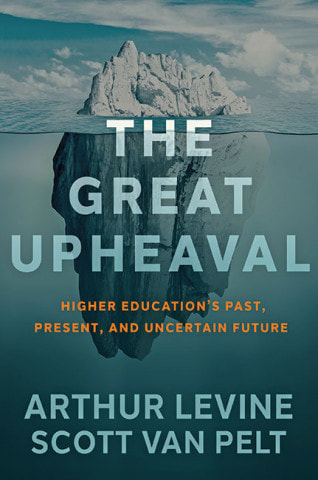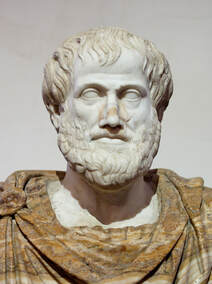
What’s the future of higher education? Will colleges survive? What’s happening to the academic institutions we know and love? Arthur Levine and Scott Van Pelt address these questions in The Great Upheaval: The Past, Present, and Future of Higher Education. For me, these aren’t abstract questions. I’ve been asking them a lot the last few years. From 1998 to 2021, I was constantly part of the academic world, first as an undergrad and grad student, then as an adjunct professor, and then as a full-time, tenured professor. But I knew something was wrong at my institution, a small Christian college. I’m not sure when the full weight of the change hit me, but perhaps it was the day I walked from my office on the third floor through the rest of our building and didn’t see a soul in the middle of the day. I walked past the second-floor library, the first-floor atrium, down the hallway toward the chapel, past the student life office, and around the cafeteria and the gym. No one. Not a person. Many institutions are experiencing numeric decline, but ours was swift and steep. We went from approximately 330 students when I came in 2008 to just under 200 in 2017, to around 90 in my last year in 2021. Certainly, our experience the last few years was a “great upheaval.”
Although every institution’s struggle has unique components, it’s helpful to place that uniqueness within a wider history and context, which is why I found The Great Upheaval helpful and enlightening. In 2021, Jeff Fisher, Sarah Behm, and I left higher education to start The Foundry, a nonprofit ministry that provides biblical and practical training for leaders at every level. So I was also interested to see what trends or insights Levine and Van Pelt offered for people like us, who love teaching and learning, but have moved beyond the walls of traditional institutions. In today’s post, I’ll highlight two observations, and continue with more in a later post.
1. Our current model of college is very recent, a blip on the historical radar.
The book is divided into three sections: a look back, a look sideways, and a look forward. In the first section, they survey the history of colleges and higher ed in the United States. They note that colleges and universities struggled to adapt to the changing world of the industrial revolution, and they chart the nearly 150-year process of adapting to the changes on technology and society, and the implications for schools. They note that industrial era schooling reflects industrial practices. There is a focus on putting all students through the same process. So this model of schooling looks at things like seat time and credit hours. Just like all cars on the assembly line go through the same process, so all students in the school go through the same process. This section highlighted that our current models of college are very recent. As someone born in 1980, my generation grew up with the expectation that everyone should go to college. But the current college model really only solidified in the 1960s and 70s, and it’s clearly on the decline again. The current models of college and the expectation that college should be a universal experience is a very short window historically. A massive shift has already begun in the broader culture. Colleges and universities that ignore it will only feel its effects sooner.
2. Higher education is way too expensive, and it’s not about to change.
In the second section, a look forward, they survey factors affecting the future of higher education. Due to a demographic sea change, colleges and universities in the Midwest and Northeast are more likely to have enrollment challenges than those in the South and West. Many small colleges will close. Even larger ones that fail to adapt will be at risk. Further, there are radical shifts in the broader culture taking place, including the swift transition to a knowledge economy and the digital revolution. A key factor in higher ed’s inability to adapt is its financial model.
Higher ed is way too expensive. In my case, I’ve been focused on training people going into full-time ministry. That’s not a high-paying field. So when I hear about people who are $40, $60, or $80,000 in debt going into ministry, I get mad, quite frankly. My dad and both grandfathers were both pastors. Christian colleges (and churches that require college degrees) are condemning some ministry leaders to literally a lifetime of debt. And, unfortunately, the only changes to the current financial model are some slight tweaks, in most cases. The current model is broken, and it’s leaving students broke. As the authors say, “Higher education as a whole is unlikely and frankly unable financially to go beyond adopting marginal remedies—limiting its tuition increases, growing its financial aid budgets, and increasing its student discount rates, the difference between its official price and what students pay” (121). In other words, the best higher ed can do is tweaking a broken system. Levine and Van Pelt point out the oddity of how higher ed institutions budget, a “cost-plus” pricing model where they determine expenses before setting their prices, a model opposite of how most organizations and households budget. In the normal, non-higher-ed world, you generally look at how much revenue and/or money you have to spend, and then budget based on that income. On top of that unhelpful financial model, the authors point out that higher ed generally grows through addition rather than substitution, further driving up costs. Finally, college is an economic anomaly in that competition actually increases cost rather than driving it down. The race to add more buildings, more sports programs, better food service, and more state-of-the-art classrooms all increase costs rather than drive them down.
I don’t know how to solve the systemic issues at play here. But I know what I can do: as someone who provides the teaching and training needed, I can construct a much less expensive alternative. Colleges and seminaries cost so much because students pay for much more than the actual learning: administrators, buildings, numerous staff positions (at our previous institution, the total expenses for faculty and library resources was something in the ballpark of 15% of the yearly budget). For a while I tried to shift the direction of my previous institution back toward ministry training and formation. But then Jeff, Sarah, and I began to ask: what if you built something where the actual teaching and learning (rather than buildings and bureaucrats) was the primary expense? It would be significantly less cost to the students and significantly more sustainable in the long run. We could provide the same training and equipping at a small fraction of the cost. Furthermore, rather than pinning the cost of an education on a young person at the beginning of adulthood, we could partner with churches, who clearly have a stake in raising up and equipping the next generation of leaders, to make Bible and ministry training much more financially sustainable. I’d seen this modeled in my Master’s program at the Institute for Christian Studies in Toronto, which operated out of one floor on a building in downtown Toronto. What did they have to offer? Stellar teachers and a learning community. No rock walls, no athletic infrastructure, no frills. Just a community of learners committed to learning and growing together—imagine that!
But I can also hear the obvious question: no frills, but no degrees. Isn't that a problem? Good question.
Next time I’ll dig into more observations from The Great Upheaval, including why degrees will matter less as we move ahead and why non-traditional organizations like The Foundry have a lot to be hopeful about looking ahead.
Although every institution’s struggle has unique components, it’s helpful to place that uniqueness within a wider history and context, which is why I found The Great Upheaval helpful and enlightening. In 2021, Jeff Fisher, Sarah Behm, and I left higher education to start The Foundry, a nonprofit ministry that provides biblical and practical training for leaders at every level. So I was also interested to see what trends or insights Levine and Van Pelt offered for people like us, who love teaching and learning, but have moved beyond the walls of traditional institutions. In today’s post, I’ll highlight two observations, and continue with more in a later post.
1. Our current model of college is very recent, a blip on the historical radar.
The book is divided into three sections: a look back, a look sideways, and a look forward. In the first section, they survey the history of colleges and higher ed in the United States. They note that colleges and universities struggled to adapt to the changing world of the industrial revolution, and they chart the nearly 150-year process of adapting to the changes on technology and society, and the implications for schools. They note that industrial era schooling reflects industrial practices. There is a focus on putting all students through the same process. So this model of schooling looks at things like seat time and credit hours. Just like all cars on the assembly line go through the same process, so all students in the school go through the same process. This section highlighted that our current models of college are very recent. As someone born in 1980, my generation grew up with the expectation that everyone should go to college. But the current college model really only solidified in the 1960s and 70s, and it’s clearly on the decline again. The current models of college and the expectation that college should be a universal experience is a very short window historically. A massive shift has already begun in the broader culture. Colleges and universities that ignore it will only feel its effects sooner.
2. Higher education is way too expensive, and it’s not about to change.
In the second section, a look forward, they survey factors affecting the future of higher education. Due to a demographic sea change, colleges and universities in the Midwest and Northeast are more likely to have enrollment challenges than those in the South and West. Many small colleges will close. Even larger ones that fail to adapt will be at risk. Further, there are radical shifts in the broader culture taking place, including the swift transition to a knowledge economy and the digital revolution. A key factor in higher ed’s inability to adapt is its financial model.
Higher ed is way too expensive. In my case, I’ve been focused on training people going into full-time ministry. That’s not a high-paying field. So when I hear about people who are $40, $60, or $80,000 in debt going into ministry, I get mad, quite frankly. My dad and both grandfathers were both pastors. Christian colleges (and churches that require college degrees) are condemning some ministry leaders to literally a lifetime of debt. And, unfortunately, the only changes to the current financial model are some slight tweaks, in most cases. The current model is broken, and it’s leaving students broke. As the authors say, “Higher education as a whole is unlikely and frankly unable financially to go beyond adopting marginal remedies—limiting its tuition increases, growing its financial aid budgets, and increasing its student discount rates, the difference between its official price and what students pay” (121). In other words, the best higher ed can do is tweaking a broken system. Levine and Van Pelt point out the oddity of how higher ed institutions budget, a “cost-plus” pricing model where they determine expenses before setting their prices, a model opposite of how most organizations and households budget. In the normal, non-higher-ed world, you generally look at how much revenue and/or money you have to spend, and then budget based on that income. On top of that unhelpful financial model, the authors point out that higher ed generally grows through addition rather than substitution, further driving up costs. Finally, college is an economic anomaly in that competition actually increases cost rather than driving it down. The race to add more buildings, more sports programs, better food service, and more state-of-the-art classrooms all increase costs rather than drive them down.
I don’t know how to solve the systemic issues at play here. But I know what I can do: as someone who provides the teaching and training needed, I can construct a much less expensive alternative. Colleges and seminaries cost so much because students pay for much more than the actual learning: administrators, buildings, numerous staff positions (at our previous institution, the total expenses for faculty and library resources was something in the ballpark of 15% of the yearly budget). For a while I tried to shift the direction of my previous institution back toward ministry training and formation. But then Jeff, Sarah, and I began to ask: what if you built something where the actual teaching and learning (rather than buildings and bureaucrats) was the primary expense? It would be significantly less cost to the students and significantly more sustainable in the long run. We could provide the same training and equipping at a small fraction of the cost. Furthermore, rather than pinning the cost of an education on a young person at the beginning of adulthood, we could partner with churches, who clearly have a stake in raising up and equipping the next generation of leaders, to make Bible and ministry training much more financially sustainable. I’d seen this modeled in my Master’s program at the Institute for Christian Studies in Toronto, which operated out of one floor on a building in downtown Toronto. What did they have to offer? Stellar teachers and a learning community. No rock walls, no athletic infrastructure, no frills. Just a community of learners committed to learning and growing together—imagine that!
But I can also hear the obvious question: no frills, but no degrees. Isn't that a problem? Good question.
Next time I’ll dig into more observations from The Great Upheaval, including why degrees will matter less as we move ahead and why non-traditional organizations like The Foundry have a lot to be hopeful about looking ahead.



 RSS Feed
RSS Feed